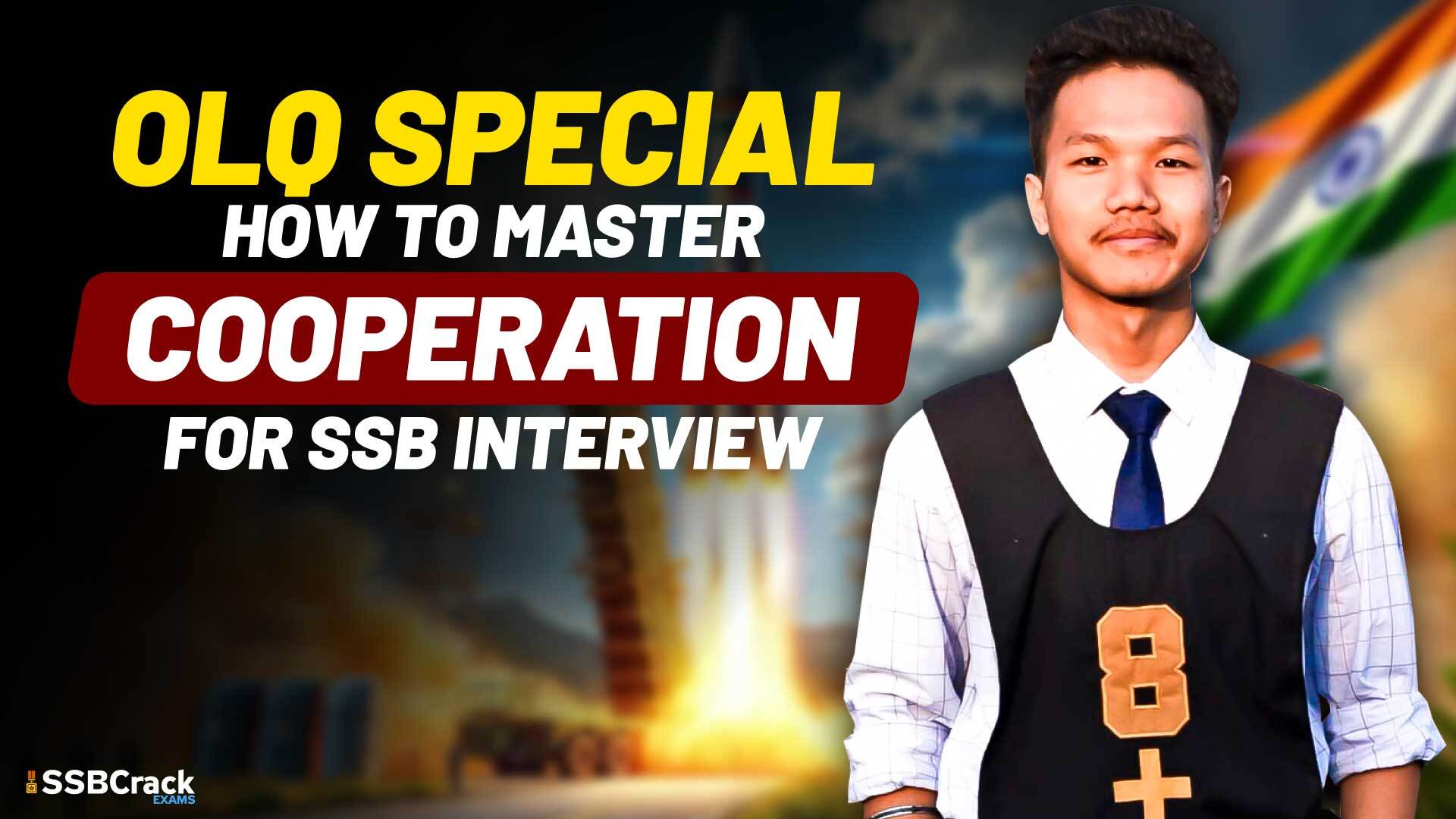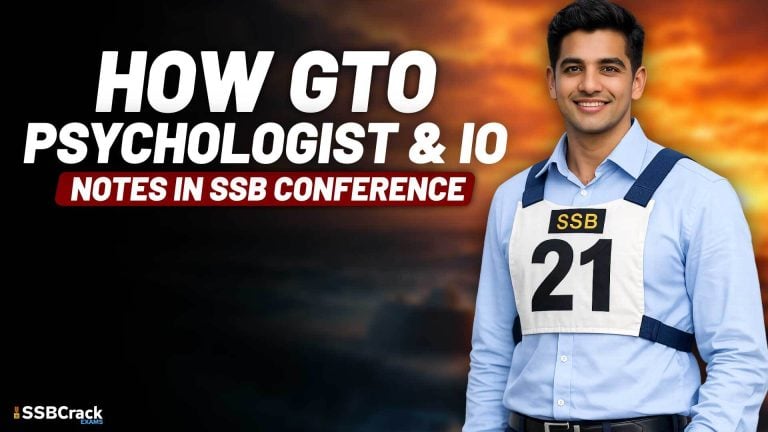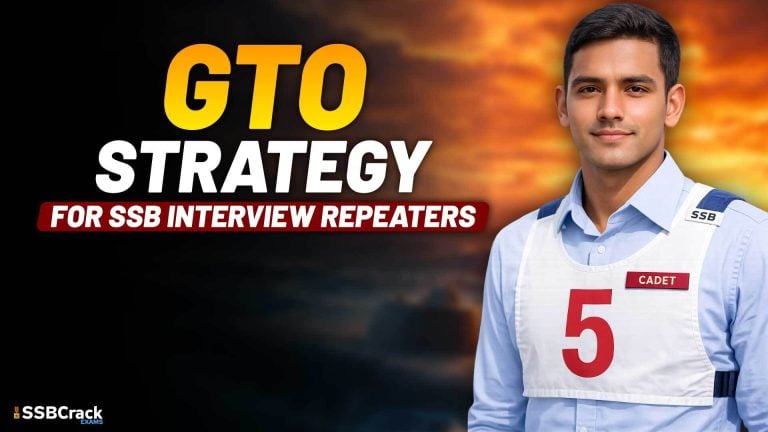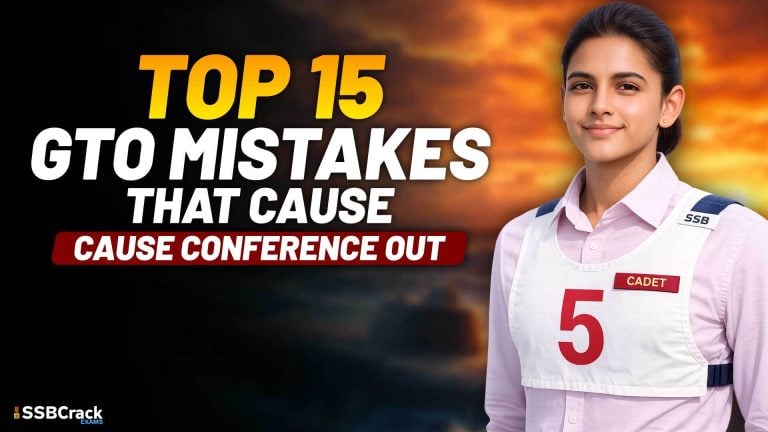Among the 15 Officer Like Qualities (OLQs) assessed in the SSB Interview, Cooperation stands out as one of the most vital traits that define your ability to work within a team. The Armed Forces thrive on teamwork, brotherhood, and mutual trust — no task, mission, or operation is executed in isolation. Hence, an SSB aspirant must display the spirit of cooperation consistently throughout the testing process.
This article explores:
- What is Cooperation as an OLQ
- Where and how it is tested in the SSB
- How to showcase it in front of assessors
- Simple yet effective ways to develop Cooperation in daily life at home, college, and workplace
What is Cooperation?
Cooperation refers to:
“The ability to work harmoniously with others in a group to achieve common goals by putting the group interest above self-interest.”
It includes:
- Team spirit
- Willingness to assist
- Harmony in action
- Respect for others’ roles and contributions
- Mutual encouragement and support
An officer must inspire, collaborate, and sometimes even sacrifice personal comfort for the greater mission — and this is what makes Cooperation a non-negotiable OLQ in the defence environment.
Where Is Cooperation Assessed in SSB?
1. Group Testing (GTO) Series
🔹 Progressive Group Task (PGT), Half Group Task (HGT), Final Group Task (FGT):
These are classic outdoor physical tasks. Assessors observe:
- Whether you help others without being told
- Share materials willingly (planks, ropes, load)
- Offer support and not just instructions
- Encourage slower teammates rather than criticizing them
🔹 Group Discussion (GD) & Group Planning Exercise (GPE):
- Cooperating by listening, building on others’ ideas, maintaining group cohesion, and not being argumentative
🔹 Command Task:
- Your selection of subordinates and how you guide them reflects your ability to foster trust and cooperation
2. Screening Test (Day 1)
- PPDT Group Discussion:
Working together with strangers, respecting turn-taking, and aligning on a common story highlight your cooperative nature.
3. Psychological Tests
- TAT, SRT:
Stories or reactions showing teamwork, selflessness, and group-oriented decisions reflect Cooperation.
4. Personal Interview
- Your real-life experiences shared in answers to questions like:
- “How do you handle conflicts in a group?”
- “Have you ever taken a backseat for a teammate to succeed?”
These reveal your cooperative tendencies.
How Is Cooperation Evaluated?
Assessors look for:
- Natural willingness to work with others
- Genuine concern for group success, not personal glory
- Readiness to help teammates physically, emotionally, or mentally
- Adjustment in group dynamics (listening, respecting, and assisting)
Important: Cooperation doesn’t mean passiveness. It means actively helping the group without imposing yourself.
How Can Aspirants Showcase Cooperation?
✔️ In Group Tasks:
- Help physically weaker members cross obstacles
- Share resources (planks, ropes) without hesitation
- Avoid ego clashes and support good ideas regardless of who gives them
- Maintain positive body language, even if your suggestion isn’t followed
✔️ In GD & GPE:
- Encourage silent members to speak
- Build on others’ plans instead of pushing only yours
- Avoid interrupting or dominating the discussion
✔️ In Command Task:
- Select and guide subordinates in a respectful, inclusive way
- Praise their efforts while taking responsibility as a leader
✔️ In Interview:
- Share stories of leading or being part of cooperative efforts — school projects, fests, sports teams, internships, etc.
- Highlight moments where you compromised or collaborated for the greater good
How to Develop Cooperation in Daily Life
Let’s look at how you can strengthen this OLQ in your everyday environment:
At Home
- Work in Family Chores
- Offer help without being asked — e.g., kitchen work, cleaning, groceries
- 🔹 Teaches team contribution without ego
- Support Siblings or Parents in Tasks
- Tutor a younger sibling, help parents with digital tasks
- 🔹 Develops selfless teamwork
- Resolve Conflicts Peacefully
- Use dialogue and empathy to manage household disagreements
- 🔹 Builds understanding and cooperation
At School/College/University
- Be a Team Player in Group Projects
- Offer help to weaker members, divide work fairly
- 🔹 Develops empathy-driven collaboration
- Volunteer in Events or Fests
- Work with people across departments; assist beyond assigned roles
- 🔹 Sharpens real-time cooperative skills
- Participate in Team Sports
- Respect team strategy over personal performance
- 🔹 Promotes synchrony, respect, and patience
At Workplace/Internship
- Assist Teammates Beyond Job Description
- Help others in urgent situations or back them up
- 🔹 Builds cooperative reliability
- Collaborate, Don’t Compete
- Share credit and accept feedback graciously
- 🔹 Boosts team morale and cohesion
- Contribute to Team Bonding
- Take initiative in creating harmony in the team
- 🔹 Enhances mutual respect and trust
Final Thoughts
Cooperation is the OLQ that speaks volumes through your actions more than your words. In the SSB, you’re not competing against your group — you’re working with them. Cooperation shows the assessors that you are capable of fostering team unity, supporting your peers, and achieving collective success — the very essence of military leadership.
So, whether it’s helping your group cross an obstacle or calmly aligning a team during a heated GD, let your cooperative nature shine through your mindset, speech, and actions.







